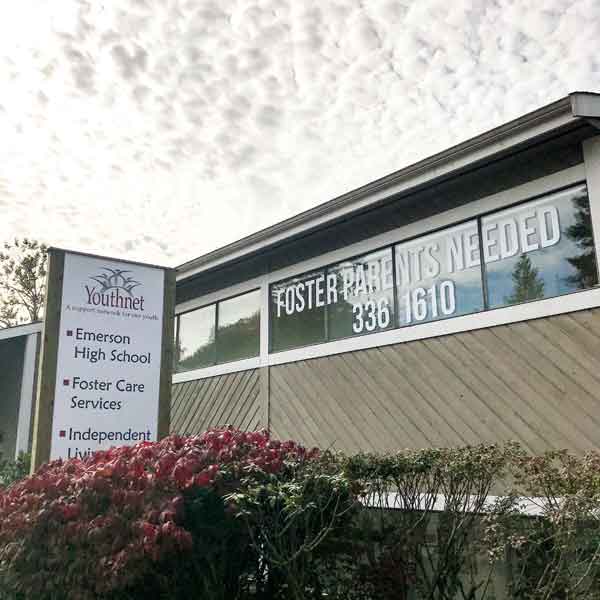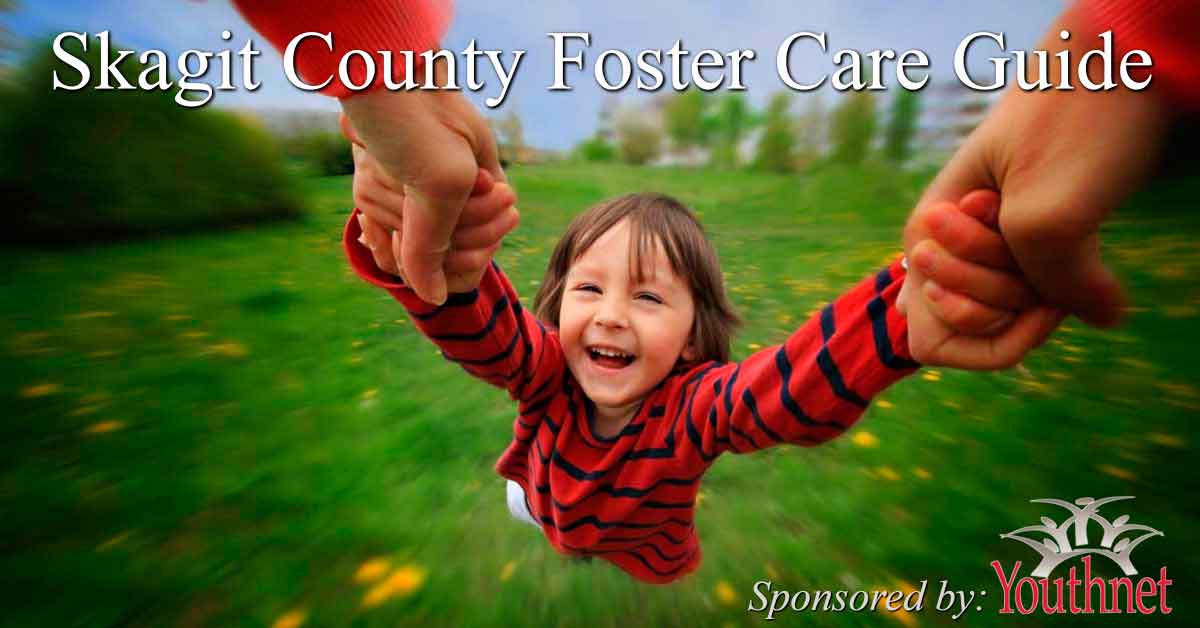YOUTHNET'S GUIDE TO FOSTER CARE
Tips & Resources for Foster Parenting
in Skagit County & Beyond!
Last Updated 10/11/22
Welcome to the Skagit County Foster Care Guide! Here you’ll find resources for current foster parents, as well as an overview of how to begin the foster care licensing process. There is a significant need for more foster homes in the Skagit Valley area. By expanding our local fostering community, we can create a safety net for children entering the foster care system. There are kids in foster care all around you. They may be your neighbor, in your child's classroom at school, or at your neighborhood park. Many of these children are being moved from their community and school because there are not enough foster homes available in their area. To learn more about foster care, respite care, support services, and the choice to license through the state of Washington or a foster care agency, keep reading and attend Youthnet's next Online Foster Care Meeting.
Children and teens enter the foster care system due to neglect or abuse. Approximately half of these kids are placed with relatives, and half are placed in licensed foster homes. During this time, their birth parents work with the state and the court system towards reunification. Reunification with biological family is always the initial goal in Washington State. If their parents are not able to reunify, the state searches for adoptive (or guardianship) families. To learn more about the history of foster care, click here.
If you suspect that a child you know is experiencing neglect or abuse, please call 1-866-END-HARM (1-866-363-4276).
HOW TO BECOME A LICENSED FOSTER PARENT
IN SKAGIT COUNTY
How do I become a foster parent?
Requirements for foster parents in Washington State:
- Be over 21 years old
- Be financially stable
- Be able to pass a criminal background check
- Meet state home safety qualifying requirements
- Participate in a home study
- Complete the required paperwork
- Attend an online Foster Caregiver Core Training and orientation (find the orientation calendar here)
- Complete First Aid/CPR and HIV/AIDS training
- Complete a TB test
- If fostering infants ages 0-2, all household members must submit current flu shot and Tdap/Dtap records
Foster parents can be single, in partnerships, or married, and they can be homeowners or renters. If you’re not sure if you qualify as a foster parent, it’s okay to ask!
We recommend contacting a variety of foster care agencies or the State of Washington (DCYF) to decide which one is the best fit for you and your family. There are foster care agencies in the Skagit, Whatcom, Island, San Juan and Snohomish County area and other counties in Washington State. To learn more about licensing through Youthnet, visit their website here.
Once you decide on an agency, you will work with your licensor to submit your paperwork and begin the licensing process. This includes a series of interviews and a home inspection with your family. After all licensing requirements are met, your licensor will submit a written home study about your family for final approval. From start to finish, it usually takes 3-5 months to become a licensed foster parent.
Foster Parent Reimbursement:
Foster parents receive a monthly reimbursement stipend for the foster children in their care to help cover the basic costs of food, activities, and other expenses. All foster children receive free medical, dental, and vision insurance through the State of Washington. Foster parents who work can receive free daycare for their foster children, if there are DCYF-approved daycare openings in your area.
Should I become a licensed foster care home through the State of Washington or a private foster care agency?
All foster parents have the option to license through the state (DCYF) or a private foster care agency. Regardless of your choice, your foster children will always have a state social worker. Many families choose to license through an agency for the additional support and consistent team of providers.
At Youthnet, there is no cost, and services include 24/7 on-call support, a case manager who serves the child and your family, weekly foster parent Zoom support groups, quarterly foster parent trainings, and case aide services depending on the age and needs of the foster child.
When you license through a foster care agency, your agency’s team will reach out to you when there is a child in need of a home who fits your family’s preferences and abilities. They provide the information they have about the child, and they seek out more information if you have questions. Agencies help you say yes to placements, and they can also help you say no, too. Many agencies, like Youthnet, do not do late night after-hours placement requests.
When you license through the state, you receive notifications and/or requests about all children on the placement list, directly from a state placement worker. They are not filtered to your preferences (as they are when you license through an agency). Some families feel confident advocating for themselves and prefer to license through the state. These families often already have experience fostering, and they know how to navigate the system.
What kinds of foster care can I provide?
Therapeutic Foster Care:
One of the biggest needs is foster parents for therapeutic foster care. Kids who qualify for therapeutic foster care quality for additional supports and services. These kids are between the ages of 5-18 and have a higher level of needs, usually due to the trauma they have experienced. Some of these kids have experienced a large number of moves, and have higher behaviors or special needs. It’s especially important for them to live in an understanding, supportive, trauma-informed home. Many of these kids have been in foster care for a long time and need an adoptive home. Even though their needs are higher than kids in traditional foster care, there are many more supports available for them and their foster families. Kids in therapeutic foster care receive weekly home visits from their case manager and monthly visits from their state social worker. By providing a safe, stable home for a child or teen in therapeutic foster care, you have the opportunity to make a significant positive impact on their future.
Traditional Foster Care:
If you don't feel that therapeutic foster care would be a good fit for your family, there is always a need for families wanting to get involved with traditional foster care. These foster parents can provide placement for kids of all ages. It is up to the preference of the family whether they would like short term or long term placements and what age range they feel would be a good fit for them. Kids in traditional foster care are often newer to foster care and have lower-level service needs. Kids in traditional foster care often have visits with their biological parents and siblings. Foster parents are not expected to supervise this contact but do need to make the child available during visit times. If licensed with Youthnet, your Youthnet visit supervisor will provide transportation and supervision for these visits. If your agency does not provide a visit supervisor, these will be facilitated by a DCYF visit supervisor. Kids in traditional foster care receive monthly home visits from their state social worker (and case manager, if licensed with an agency).
Respite Foster Care:
If you’re not ready for full-time placements, becoming a respite foster parent is a great way to start! In the same way that typical families have the option for their kids to spend an occasional weekend with grandparents or aunts/uncles, foster families have this option, too. Respite foster parents take in foster kids for a short period of time (usually one weekend or one week) while their foster parents go on vacation or take some time to themselves. Respite foster parents go through the exact same licensing process as foster parents, so if you ever decide you’re ready for full-time placements, no additional paperwork is required. Respite is a great way to get to know the foster care system and build your foster parenting skillset.
Youthnet's Therapeutic Foster Care Program
with Jon Rylaarsdam, Therapeutic Foster Network Program Director
Youthnet's Foster Care Program
RESOURCES FOR CURRENT FOSTER PARENTS
Educational Support for Foster Care Families
- Blue Skies for Children
- Your School District Foster Care Liaison
Clothing for Foster Care Families
- Sprouts Clothing (Burlington)
- Foster parents are given a 15% discount for their foster children on Saturdays
- Foster parents are given a 15% discount for their foster children on Saturdays
- The Foster Closet (Bellingham)
- Free clothing and household items for foster families
- Free clothing and household items for foster families
Camps for Foster Kids
- For All Kids
- For Foster Youth
- Camp To Belong (for siblings)
- Royal Family Kids
- Teen Reach Adventure Camp
Traditional Talk Therapy
Alternative Therapies
Parenting Support
- Youthnet’s In-home Services Program
- Brigid Collins Parenting Academy
- Skagit Strengthening Families Program
Training for Foster Parents
- Rise with the Alliance
- Youthnet’s quarterly trainings, if licensed through Youthnet
- CASA
LGBTQ
- LGBTQ+ In Foster Care
- Northwest Youth Services: Queer Youth Project
- PFLAG
- The Trevor Project
- National Center for Transgender Equality
Resources for Aging Out of Foster Care
- Washington Extended Foster Care
- Youthnet’s Independent/Transitional Living Services
- Independence: For Washington State Foster Youth
- Driver’s Education and Auto Insurance
- Education and Careers:
- Housing Resources
- Foster Care Alumni
Volunteer Opportunities
Foster Care Blogs
ABOUT YOUTHNET
Youthnet expanded their services in 2017 to include therapeutic foster care. These programs work seamlessly together, allowing a foster family to work with kids of all ages and needs. Youthnet’s team values relationships and normalized experiences for kids in foster care. Kids in care often face barriers in their education, getting involved in activities, maintaining friendships, maintaining relationships with family, and so much more. Youthnet works to provide opportunities to make all of these things more accessible to these children.
To learn more about their foster care services, or how to begin the licensing process, visit their website or attend a Foster Care Info Meeting. Your Youthnet licensor will walk you through the entire licensing process. Once licensed, your Youthnet case manager will provide weekly or monthly home visits to ensure everyone in the home feels safe and supported. Your case manager can provide suggestions and resources, and help coordinate services with your foster child’s service team. Families have access to Youthnet’s 24/7 support line at all times. Case aide services are available for some foster children, depending on their age and needs. All Youthnet families are invited to attend quarterly foster parent support meetings, training opportunities, and seasonal celebration events, such as a summer BBQ and holiday party.
In addition to foster care services, Youthnet’s programs include:
- Independent and Transitional Living Services
- Supplemental Education Transition Planning
- In-Home Family Services
- El Sol Nace Para Todos
227 N. 4th Street
Mount Vernon, WA
360-336-1610

Thank you to Youthnet for sponsoring the Skagit County Foster Care Guide!
You can follow them on Facebook to stay in-the-loop about foster care parenting in Skagit County.
All material contained in this guide is copyrighted and protected under the Digital Millennium Copyright Act. No part of this guide may be copied or reproduced in any way. Skagit Kid Insider is not recommending the information in this third party guide and cannot be held responsible for anything contained within it.



